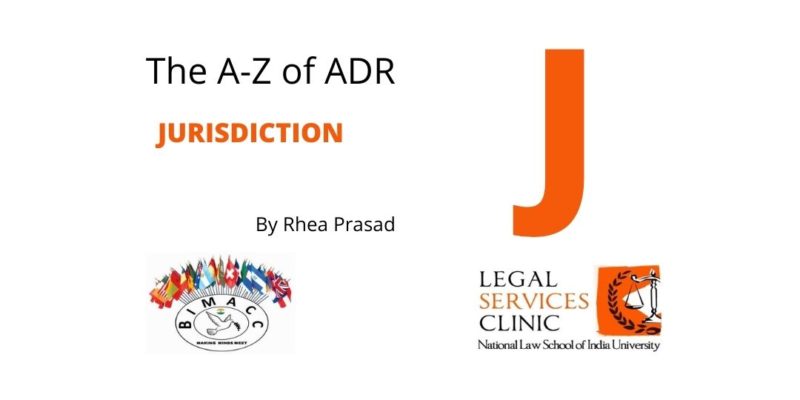
A-Z of ADR: Jurisdiction
-Rhea Prasad (II Year, NLSIU Bangalore)
Jurisdiction in arbitration can be classified under two heads
- The arbitrability of the dispute i.e. whether it is a matter suitable to be referred to arbitration
- The jurisdiction of the arbitral tribunal
Arbitrability of the Dispute
Generally, under the Arbitration and Conciliation Act (Act), persons who are party to a recognized legal relationship, whether contractual or otherwise, can refer their disputes arising from such relationships to arbitration. Disputes mainly of a civil nature are qualified as arbitrable disputes and criminal matters cannot be settled through arbitration. Even if disputes are not of civil nature, as long as they are not of criminal nature they can be referred to arbitration. However, this is subject to the limitations imposed by section 2(3) of the Act which provides for disputes that cannot be resolved through arbitration. This includes:
- Disputes related to dissolution and winding up of an incorporated company
- Industrial disputes
- Criminal proceedings
- Charitable trust disputes
- Matrimonial causes (except separation and divorce)
- Validity of will
- Insolvency disputes
These matters, as well as other matters referred to in Section 2(3), cannot be referred to arbitration and if parties erroneously do so the arbitral tribunal cannot validly exercise jurisdiction in these matters.
Jurisdiction of the Arbitral Tribunal
Section 16 of the Act which is modelled on the UNCITRAL rules provides that “The arbitral tribunal may rule on its own jurisdiction, including ruling on any objections with respect to the existence or validity of the arbitration agreement”. This is known as the principle of kompetenz-kompetenz which means that the arbitral tribunal has the freedom of choosing its own jurisdiction and it is not subject to interference from the Court unless expressly prohibited under the Act.
Further, an arbitral tribunal does not have statutory jurisdiction. The tribunal derives the scope and extent of its jurisdiction from the arbitration agreement which forms the basis of the process of arbitration.
There are certain instances however in which the competence of the arbitral tribunal becomes subject to questioning. Under Section 11 of the Act if the Chief Justice looks into the jurisdiction of the tribunal then it acts as a restriction on the tribunal’s powers.[1]
The question of jurisdiction also arises in the enforcement of arbitral awards. In Sundaram Finance v Abdul Samad & Anr.[2] The Supreme Court ruled that any arbitral award under the Act can be enforced in all courts of competent jurisdiction. With respect to foreign arbitral awards, India is a signatory to the Convention on the Recognition and Enforcement of Foreign Arbitral Awards, 1958 as well as the Geneva Convention on the Execution of Foreign Arbitral Awards, 1927. According to these, a party who receives a binding award from any signatory of the conventions can enforce the award in appropriate courts in India.
Lastly, is the matter of appeal against arbitral awards. The Supreme Court held that no appeal can lie against the merit of the arbitral awards. However, under section 34 of the Act, there are certain grounds for setting aside the arbitral award which are incapacity, invalid agreement, inefficiency of the parties, incongruity in the subject of the arbitration proceedings, discrepancy in the appointment process and the agreement being opposed to public policy.
The Amendment Act specifies that an arbitral award cannot be set aside by the Court merely on an erroneous application of law or re-appreciation of evidence.
Arbitration as a process aims to give priority to party autonomy and achieve efficiency in dispute proceedings. Therefore, the scope of arbitrability of disputes and the extent of jurisdiction of the arbitral tribunal has been significantly widened to ensure that these aims are met.
[1] Union of India vs. M/s. East Coast Boat Builders & Engineers Ltd. 76 (1998) DLT 958
[2] 1999 (2) SCC 479
-Rhea Prasad (II Year, NLSIU Bangalore)
Rhea Prasad is a second-year student from the National Law School of India University (NLSIU), Bangalore.
BIMACC expresses its gratitude towards the author and to the members of the Legal Services Clinic, National Law School of India University (NLSIU) for their support in our collaborative efforts to promote ADR with this series titled “A-Z of ADR”. The purpose of this series is to increase the understanding of certain fundamental concepts of Alternative Dispute Resolution.
The Legal Services Clinic is a student-run committee that provides free legal services to the socially and the economically backward sections of the society who have difficulty accessing the judicial system. It also has a mandate of spreading legal awareness and providing free legal assistance to those who cannot afford it.
Website: www.legalservicesclinic.org/
Facebook: @legalservicesclinic
Email: lsc.nlsiu@gmail.com
Phone Number: 073586 73214
Disclaimer: The views and opinions expressed in this blog are those of the author and do not necessarily reflect the official policy or position of BIMACC, any of the members of the Board, or the empanelled neutrals. This blog is for informative purpose only and does not constitute legal advice in any manner whatsoever.
